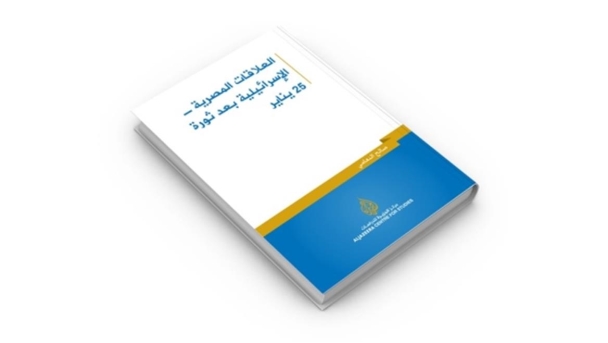
The revolution of 25 January 2011 was a momentous, foundational event in Egypt’s history. In its early stages, it brought down Hosni Mubarak, who had ruled for 30 years, and paved the way for major transformations in the local political scene, including the rise of the Muslim Brotherhood to power for the first in its history. The uprising similarly set in motion shifts in Egypt’s relationship with its regional environment, especially with Israel, changing the nature and direction of these ties. These changes are explored in the new book issued by the Al Jazeera Centre for Studies, titled Egyptian-Israeli Relations after the January 25 Revolution.
The revolution set in motion a cascade of transformations, bringing shifts in the governing environment in Egypt, including within the leading elite. It also elevated the stature of public opinion, making it a core factor in decision-making. The author of the book, Dr. Saleh El-Naami, believes that Egyptian-Israeli relations since 25 January 2011 have undergone several changes. An examination of the influence of the revolution on the context of these ties therefore assumes great importance, for it offers the opportunity to explore the nature of these transformations and their effects on the region, as well as understand future prospects.
Due to the rapid pace of developments in Egypt since the revolution, the literature in Arabic examining these relations has been limited to a description of the changes. El-Naami found that no study has looked closely at these shifts as they pertain to Egyptian-Israeli relations since the uprising, which makes this book especially important.
In approaching the issue under study, El-Naami adopts a historical perspective, tracing the development of Egyptian-Israeli relations and their nature in the era of Hosni Mubarak, the Supreme Council of the Armed Forces, Mohamed Morsi and finally Abdel Fattah El-Sisi, and comparing these eras to identify the shifts particular to each age. He also uses the lens of decision making to understand the influence that each Egyptian political regime had on the relationship with Israel, and he describes the interactions, conduct and activities that express and illustrate this relationship.
The study consists of four chapters and a conclusion. Chapter one discusses the determinants, context and characteristics of Egyptian-Israeli relations before 25 January 2011, while chapter two takes up shifts in the relationship after the revolution and until the election of Mohamed Morsi, looking at the context and determinants of the relationship in this period, as well as Israeli concerns about the revolution and its consequences and the means Israel used to frustrate the revolution and confront its repercussions. This chapter also describes the Egyptian political elite’s stance on Israel in this period, tracing the transformations in bilateral relations.
Chapter three examines Egyptian-Israeli relations in the age of Mohammed Morsi, looking at the determinants of the relationship, transformations in this period and the impact of Morsi’s presidency on the Palestinian-Israeli conflict, as well as Israeli concerns about measures taken by Morsi on both the domestic and foreign fronts. This chapter also examines the mechanisms by which Israel engaged with this phase.
Chapter four discusses the determinants of Egypt’s relationship with Israel under El-Sisi, its characteristics and its underpinnings. It also describes shifts in Egyptian-Israeli ties and aspects of bilateral cooperation in this period and its consequences, especially the partnership to confront the Palestinian resistance. In addition, this chapter seeks to understand Israel’s assessment of the benefits of strategic cooperation with the Sisi regime.
Publication details
Title: Egyptian-Israeli Relations after the 25 January Revolution
Author: Saleh El-Naami
Publisher: Al Jazeera Centre for Studies and al-Dar al-Arabi lil-Ulum
Date: 2017